19 scholarly books by New Issues Poetry and Prose
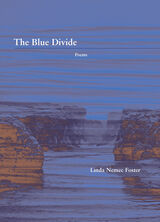
Linda Nemec Foster
New Issues Poetry and Prose
The poems in this powerful new collection explore the history of conflict and resilience—whether it occurs during the Nazi occupation of Poland, the Balkan wars in Bosnia and Croatia, or within the intimate tableaux of a family’s dissonance. Weaving poems into three distinct sections, Linda Nemec Foster pays close attention to not only what divides us, but also to what can heal and redeem our common journey: an artist’s notebook; the imagined life of Mary Magdalene; a fascination with Mount Fuji; a mother’s obsession with vintage movie stars; a dead father’s love. The Blue Divide resonates with the landscape of the world and the landscape of the heart.
[more]
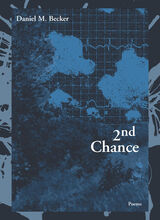
2nd Chance
Daniel Becker
New Issues Poetry and Prose, 2020
The poems in 2nd Chance are written in the voice of a doctor; the speaker often imagines he is talking to students, residents, patients, families—anyone who is ill or has witnessed illness and suffering. The poet, Daniel M. Becker, has been a physician for over thirty years, working in general medicine, geriatric clinics, and addiction clinics, supervising medical students and residents, and more. With poems such as “Goals of Care,” “Before Flu Season,” and “Advance Directives,” 2nd Chance covers the full spectrum of medical care—birth, death, and all the surprising moments in between. Written with warmth and empathy for the human condition, these poems attempt to understand, share, and honor what both patients and medical professionals experience. Serious matters are approached with intelligence, humility, and humor, making this collection an affecting entry into the growing field of medical poetry.
[more]
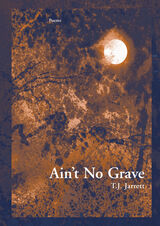
Ain't No Grave
TJ Jarrett
New Issues Poetry and Prose, 2013

Barren Island
Carol Zoref
New Issues Poetry and Prose, 2017
How does one remember a world that literally no longer exists? How do the moral imperatives to do so correspond to the personal needs that make it possible? Told from the point-of-view of Marta Eisenstein Lane on the occasion of her 80th birthday, Barren Island is the story of a factory island in New York’s Jamaica Bay, where the city’s dead horses and other large animals were rendered into glue and fertilizer from the mid-19th century until the 1930’s. The island itself is as central to the story as the members of the Jewish, Greek, Italian, Irish, and African-American factory families that inhabit it, including those who live their entire lives steeped in the smell of burning animal flesh. The story begins with the arrival of the Eisenstein family, immigrants from Eastern Europe, and explores how the political and social upheavals of the 1930’s affect them and their neighbors in the years between the stock market crash of October 1929 and the start of World War II ten years later. Labor strife, union riots, the New Deal, the World’s Fair, and the struggle to save European Jews from the growing threat of Nazi terror inform this novel as much as the explosion of civil and social liberties between the two World Wars. Barren Island, finally, is a novel in which the existence of God is argued with a God that may no longer exist or, perhaps, never did.
[more]

Boy Meets Girl
Christie Hodgen
New Issues Poetry and Prose, 2022
Told in two alternating timelines, this novel follows a friendship over twenty-five years.
Boy Meets Girl is the story of a twenty-five-year friendship between Sammy Browne (young, idealistic, and broke) and Ben Eisenberg (older, jaded, and almost unimaginably rich)—two characters drawn together, and ultimately torn apart, by their differences. This novel tells the story of their relationship over the decades—from youthful flirtation to unrequited love, to long-term friendship that flourishes in middle age, to estrangement and then reunion. The novel unfolds in alternating chapters, toggling back and forth between Ben and Sammy as young people and in middle age, showing everything the characters hoped to become and how things turned out for them. Boy Meets Girl unfolds against the political and social backdrop of the last three decades, with Bill Clinton’s election, the events of September 11, the wars in Iraq and Afghanistan, and even the Trump era providing context and contrast for the personal stories of the main characters.
Boy Meets Girl is the story of a twenty-five-year friendship between Sammy Browne (young, idealistic, and broke) and Ben Eisenberg (older, jaded, and almost unimaginably rich)—two characters drawn together, and ultimately torn apart, by their differences. This novel tells the story of their relationship over the decades—from youthful flirtation to unrequited love, to long-term friendship that flourishes in middle age, to estrangement and then reunion. The novel unfolds in alternating chapters, toggling back and forth between Ben and Sammy as young people and in middle age, showing everything the characters hoped to become and how things turned out for them. Boy Meets Girl unfolds against the political and social backdrop of the last three decades, with Bill Clinton’s election, the events of September 11, the wars in Iraq and Afghanistan, and even the Trump era providing context and contrast for the personal stories of the main characters.
[more]

The Golden Land
Elizabeth Shick
New Issues Poetry and Prose, 2022
Winner of the AWP Prize for the Novel, this debut novel digs deep into the complexities of family history and relationships.
When Etta's grandmother dies, she is compelled to travel to Myanmar to explore complicated adolescent memories of her grandmother's family and the violence she witnessed there. Full of rich detail and complex relationships, The Golden Land explores those personal narratives that might lie beneath the surface of historical accounts.
When Etta's grandmother dies, she is compelled to travel to Myanmar to explore complicated adolescent memories of her grandmother's family and the violence she witnessed there. Full of rich detail and complex relationships, The Golden Land explores those personal narratives that might lie beneath the surface of historical accounts.
[more]
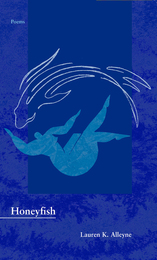
Honeyfish
Lauren K. Alleyne
New Issues Poetry and Prose, 2018
“These poems love. Prophesize. Return us to our beginnings. To
days that we want to remember. Or forget. But don’t. Thus in our
sister’s memory, we survive in the luxury of dying. The courage of
loving. The re-imagining of our souls for another generation. Thank
you, my dear sister for your words saluting our living, our lives.”
—Sonia Sanchez, winner of the 2018 Lifetime Achievement Award
from the Academy of American Poets
“In exquisitely crafted poems of heart-accelerating candor and
clarity, Lauren K. Alleyne says to all the black bodies slain by hatred
and militarized fear, ‘Nothing I say will save you, but how can I say
nothing?’ Honeyfish is an elegy for all the countless lost, and a praise
song for the many black lives that persist in their wish to give and
receive love.”
— Tracy K. Smith, Poet Laureate of the United States of America
“Even in the places we think of as most beautiful, the endless gong
of the body being broken and defiled will find us. How can we see
the sun and the ocean and the clear blue sky as anything other than
a kind of cruel joke in the face of so much suffering? The extraordinary gift of Lauren K Alleyne’s, Honeyfish is that she shows
the world in all its brutality and loss and somehow lets us mourn within the poems, which in
turn allows us to begin some kind of healing. These are poems whose elegy is ongoing, whose
elegy need never happened but for hatred. The waves go in and out and so many people keep
being killed. And here is this extraordinary poet, making a heaven that is freedom, that is the
dream of being welcomed and loved and tended to. This is a book for our times and for the
day when these times are over and we can rejoice.”
— Gabrielle Calvacoressi, author of Rocket Fantastic
days that we want to remember. Or forget. But don’t. Thus in our
sister’s memory, we survive in the luxury of dying. The courage of
loving. The re-imagining of our souls for another generation. Thank
you, my dear sister for your words saluting our living, our lives.”
—Sonia Sanchez, winner of the 2018 Lifetime Achievement Award
from the Academy of American Poets
“In exquisitely crafted poems of heart-accelerating candor and
clarity, Lauren K. Alleyne says to all the black bodies slain by hatred
and militarized fear, ‘Nothing I say will save you, but how can I say
nothing?’ Honeyfish is an elegy for all the countless lost, and a praise
song for the many black lives that persist in their wish to give and
receive love.”
— Tracy K. Smith, Poet Laureate of the United States of America
“Even in the places we think of as most beautiful, the endless gong
of the body being broken and defiled will find us. How can we see
the sun and the ocean and the clear blue sky as anything other than
a kind of cruel joke in the face of so much suffering? The extraordinary gift of Lauren K Alleyne’s, Honeyfish is that she shows
the world in all its brutality and loss and somehow lets us mourn within the poems, which in
turn allows us to begin some kind of healing. These are poems whose elegy is ongoing, whose
elegy need never happened but for hatred. The waves go in and out and so many people keep
being killed. And here is this extraordinary poet, making a heaven that is freedom, that is the
dream of being welcomed and loved and tended to. This is a book for our times and for the
day when these times are over and we can rejoice.”
— Gabrielle Calvacoressi, author of Rocket Fantastic
[more]
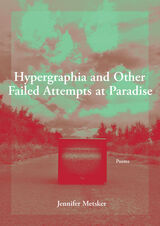
Hypergraphia and Other Failed Attempts at Paradise
Jennifer Metsker
New Issues Poetry and Prose, 2021
A collection of poems that delve into the experience of living with bipolar disorder.
This collection of poetry explores the disruptive state of psychosis, with all its insights and follies, and the challenges of living life after a departure from the self. These poems reach for an understanding of the ecstasy and tragedy of madness through both lyric and prose forms that mimic the sublime state of mania through their engagement with language. Ordinary life becomes strange in these poems, which are playful and humorous at times and dark at others, as they seek resolution to the question of what happens when the mind overthrows the body.
This collection of poetry explores the disruptive state of psychosis, with all its insights and follies, and the challenges of living life after a departure from the self. These poems reach for an understanding of the ecstasy and tragedy of madness through both lyric and prose forms that mimic the sublime state of mania through their engagement with language. Ordinary life becomes strange in these poems, which are playful and humorous at times and dark at others, as they seek resolution to the question of what happens when the mind overthrows the body.
[more]
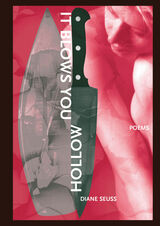
It Blows You Hollow
Diane Seuss
New Issues Poetry and Prose, 1998
With these dark, triumphant poems, Diane Seuss takes us on a journey through the landscape of the soul––and it’s a world full of beauty and violence in equal parts. Relentless and incantatory, these poems are charged with an almost religious intensity as Seuss looks for God’s presence in nature and sexuality. Again and again the poet confronts whatever it is that guides us through a life that is sensuous, yet exacting in its terrible cost.
Nothing is solved by the end of this book, but much is gained as the quest itself has become a victory of perfectly pitched and furious language. God’s still hidden away, but by now the natural world has evolved to replace the absence Seuss feels. In the book’s erotically charged universe, one paradoxically begins to feel a calm settle over the burned-up panorama of the soul. It Blows You Hollow is a book, rare these days, that feels as if it had to be written. Diane Seuss goes for broke.
Nothing is solved by the end of this book, but much is gained as the quest itself has become a victory of perfectly pitched and furious language. God’s still hidden away, but by now the natural world has evolved to replace the absence Seuss feels. In the book’s erotically charged universe, one paradoxically begins to feel a calm settle over the burned-up panorama of the soul. It Blows You Hollow is a book, rare these days, that feels as if it had to be written. Diane Seuss goes for broke.
[more]

The Mending Worm
Joan Houlihan
New Issues Poetry and Prose, 2021

Motherlunge
Kirstin Scott
New Issues Poetry and Prose, 2013
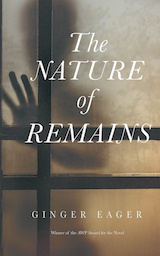
The Nature of Remains
Ginger Eager
New Issues Poetry and Prose, 2020
In Flyshoals, Georgia, karma is writ small enough to witness. When Doreen Swilley discovers that her boss and lover of thirty years intends to fire her to placate his dying wife, she devises a plan to steal his business from him. Her plan just might work too, if she is not thwarted by a small town’s enmeshed histories and her family’s own dark secrets.
Set during the 2009 recession, The Nature of Remains rests at the intersection of class, gender, education and place. Through extended geological metaphor, readers witness the orogeny, crystallization, and weathering of the human soul. Doreen’s journey reveals the ways even a woman’s most precious connections—her children, her grandchildren, her lover—operate within larger social structures capable of challenging her sovereignty.
Set during the 2009 recession, The Nature of Remains rests at the intersection of class, gender, education and place. Through extended geological metaphor, readers witness the orogeny, crystallization, and weathering of the human soul. Doreen’s journey reveals the ways even a woman’s most precious connections—her children, her grandchildren, her lover—operate within larger social structures capable of challenging her sovereignty.
[more]
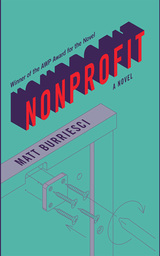
Nonprofit
Matt Burriesci
New Issues Poetry and Prose, 2015
Thrust into the bizarre labyrinth of DC society, John MacManus struggles to rescue a bankrupt nonprofit while starting a family. Wackiness ensues.
[more]
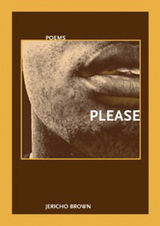
Please
Jericho Brown
New Issues Poetry and Prose, 2008
Please explores the points in our lives at which love and violence intersect. Drunk on its own rhythms and full of imaginative and often frightening imagery, Please is the album playing in the background of the history and culture that surround African American/male identity and sexuality. Just as radio favorites like Marvin Gaye, Donny Hathaway, and Pink Floyd characterize loss, loneliness, addiction, and denial with their voices, these poems’ chorus of speakers transform moments of intimacy and humor into spontaneous music. In Please, Jericho Brown sings the influence soul culture has on American life with the accuracy of the blues.
[more]
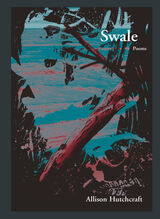
Swale
Allison Hutchcraft
New Issues Poetry and Prose, 2020
This collection is named for a “swale,” a shallow channel used to direct the flow of rainwater. Similarly, Swale looks outward to the natural world and directs its focus inward to the landscape of the mind. The past presses in like a thick mist: plundering colonial ships and the cracking edges of empire coincide with contemporary scenes and personal erosions and failures. Alongside humans are animals both living and extinct: manatees, sea turtles, and whales; roaming bears, horses, and lambs; and the flightless dodo and Steller’s sea cow, gone for centuries. What happens when the mind eclipses what the body sees, and neither can be trusted—when demarcations between land and water blur, and one’s sense of self begins to recede?
Swale interrogates the violence of colonialism and its reverberations over time, as well as the extinction and the rapid decline of animal species. By turns tidal and cloistered, Swale speaks of science, reliquaries, and lapis lazuli, traversing forests, seascapes, and meadows. Here, the ocean becomes a field, a medieval tapestry transforms into a space that can be entered, and the body is fleshless, struck through with light. The speaker of these poems is ultimately unfixed—and with that comes both imaginative possibility and a personal unmooring. In poems that cast and recast the interior self in different guises—from the perpetually off-kilter Alice to the divergent voices of the shorn lamb and predatory foxhound—an unsettling anxiety grows starker, along with the wish for repair.
Swale interrogates the violence of colonialism and its reverberations over time, as well as the extinction and the rapid decline of animal species. By turns tidal and cloistered, Swale speaks of science, reliquaries, and lapis lazuli, traversing forests, seascapes, and meadows. Here, the ocean becomes a field, a medieval tapestry transforms into a space that can be entered, and the body is fleshless, struck through with light. The speaker of these poems is ultimately unfixed—and with that comes both imaginative possibility and a personal unmooring. In poems that cast and recast the interior self in different guises—from the perpetually off-kilter Alice to the divergent voices of the shorn lamb and predatory foxhound—an unsettling anxiety grows starker, along with the wish for repair.
[more]

To Zenzi
Robert L. Shuster
New Issues Poetry and Prose, 2021
To Zenzi is the extraordinary story of Tobias Koertig’s odyssey through the apocalypse of Berlin in 1945. An orphaned thirteen-year-old who loves to draw, Tobias is coerced into joining the German youth army in the last desperate weeks of the war. Mistaken for a hero on the Eastern Front, he receives an Iron Cross from Hitler himself, who discovers the boy’s cartoons and appoints Tobias to sketch pictures of the ruined city.
Shuttling between the insanity of the Führer’s bunker and the chaotic streets, Tobias must contend with a scheming Martin Bormann, a deceitful deserter, the Russian onslaught, and his own compounding despair—all while falling for Zenzi, a girl of Jewish descent (a mischling) who relays secret news of death camps and convinces Tobias to make a treacherous escape to the Americans.
With thrilling risks in plotting and prose, with moments of pathos and absurdity, Shuster richly conjures a mad, tragic world.
Shuttling between the insanity of the Führer’s bunker and the chaotic streets, Tobias must contend with a scheming Martin Bormann, a deceitful deserter, the Russian onslaught, and his own compounding despair—all while falling for Zenzi, a girl of Jewish descent (a mischling) who relays secret news of death camps and convinces Tobias to make a treacherous escape to the Americans.
With thrilling risks in plotting and prose, with moments of pathos and absurdity, Shuster richly conjures a mad, tragic world.
[more]
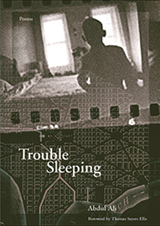
Trouble Sleeping
Abdul Ali
New Issues Poetry and Prose, 2015
"Ali’s poems consistently engage black history and pop culture as windows into more personal, yet deeply political, realms: 'Begin with a shooting,/ a controversial art exhibit, a mob throwing dung at the Black Madonna'. . . Ali’s willful, complex collection marks him as a poet to watch."
— Publisher’s Weekly
— Publisher’s Weekly
[more]

What Ends
Andrew Ladd
New Issues Poetry and Prose, 2014
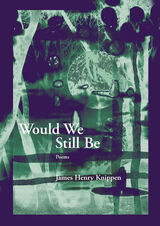
Would We Still Be
James Henry Knippen
New Issues Poetry and Prose, 2021
Poems that acknowledge the existential anxieties of our age while continuing to celebrate the beauty and musicality of language.
In Would We Still Be, James Henry Knippen crafts the anxieties that emanate from human existence—grief, fear, hopelessness, uncertainty—into poetic reflections that express a deep reverence for the musicality and incantational capacity of language. Like a moon or a wren, two of the book’s obsessions, these haunting poems call us to consider beauty’s connection to the transitory. Among the ghosts that wander these pages—those of loved ones, those we are, and those we will become—Knippen asks if image is enough, if sound is enough, if faith is enough. In doing so, these poems seek out the soul’s communion with voice, encouraging us to sing our fate.
In Would We Still Be, James Henry Knippen crafts the anxieties that emanate from human existence—grief, fear, hopelessness, uncertainty—into poetic reflections that express a deep reverence for the musicality and incantational capacity of language. Like a moon or a wren, two of the book’s obsessions, these haunting poems call us to consider beauty’s connection to the transitory. Among the ghosts that wander these pages—those of loved ones, those we are, and those we will become—Knippen asks if image is enough, if sound is enough, if faith is enough. In doing so, these poems seek out the soul’s communion with voice, encouraging us to sing our fate.
[more]
READERS
Browse our collection.
PUBLISHERS
See BiblioVault's publisher services.
STUDENT SERVICES
Files for college accessibility offices.
UChicago Accessibility Resources
home | accessibility | search | about | contact us
BiblioVault ® 2001 - 2024
The University of Chicago Press









